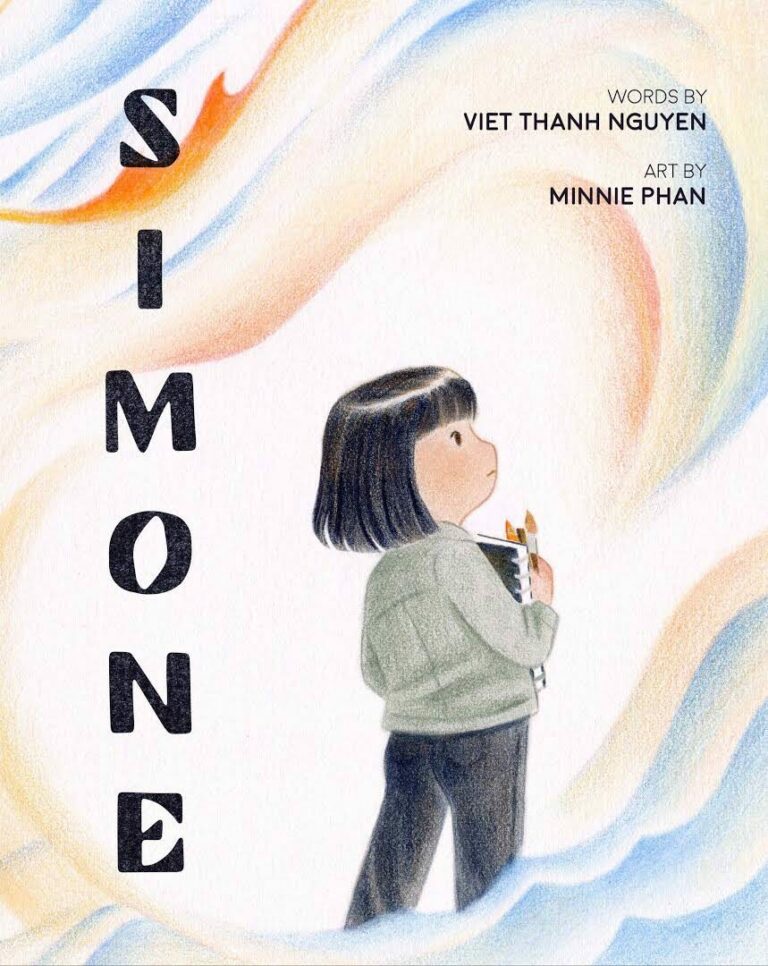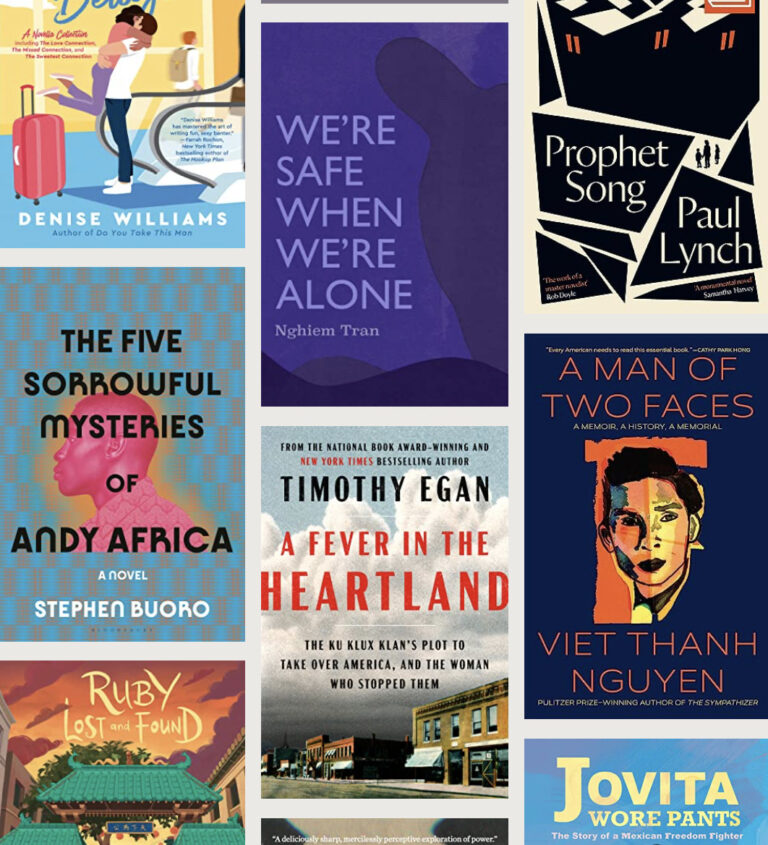Chris Cummins reviews The Sympathizer by Viet Thanh Nguyen. Originally published on FM4.

Hilarious, devastating and gripping, Viet Thanh Nguyen’s Pulitzer Prize winning novel The Sympathizer, published this month in German, is a tour de force set at the end of the Vietnam War.
When you belong nowhere, you can fit in pretty much everywhere. When you struggle to adhere to any fixed belief system, you can understand everyone’s point of view. That can be a blessing but it can also be curse. The world can be an inhospitable place for the man in the middle.
“I am a spy, a sleeper, a spook, a man of two faces. Perhaps not surprisingly, I am also a man of two minds,” declares the narrator in the memorable opening lines of The Sympathizer, Viet Than Nguyen’s debut novel, “I am not some misunderstood mutant… I am simply able to see any issue from both sides.”
The novel, which won the Pulitzer Prize, takes the form of a confession written by The Captain to a man referred to as “my dear Commandant”. It begins with a thrilling evocation of the fall of Saigon in 1975.
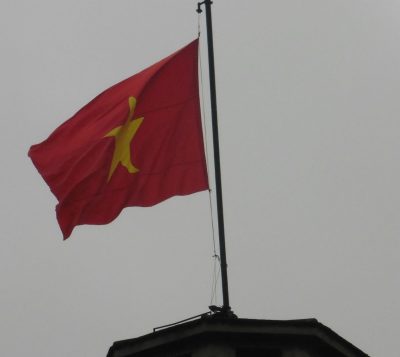
A Growing Sense of Doom
It’s April, “the cruellest month” and the advancing communists are at the gates and the well-connected high officials of the dying South Vietnam regime are preparing to escape to America, leaving the bewildered citizenry and rank-and-file soldiers to their fate.
The Captain, a mixed-race loner with a talent for languages and logistics, is a Communist mole who has been working as the trusted right-hand man of a South Vietnamese general. Having prepared the evacuation of the general’s family, he spends one last night in a Saigon beer garden.
Nguyen masterly ramps up the tension and sense of foreboding. As the bombs fall on the near horizon, you can feel the sweat drip in the tropical night and smell the beery breath of the terrified southerners. The Captain joins his fellow drinkers in toasting a disappearing world with renditions of the Beatles’ Yesterday.
“Their beloved city was about to fall but mine was soon to be liberated. It was the end of their world, but only a shifting of worlds for me. So it was that for two minutes we sang with all our hearts… swimmers doing backstroke toward a waterfall.”
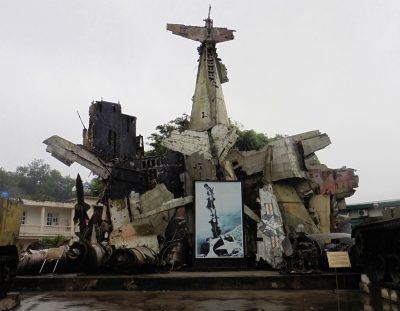
The Sympathizer is a spy thriller. It’s a genuine page turner. But it is much more besides: a study of loyalty, an examination the scars of war and of race relations, and it’s a vivid portrait of the immigrant experience of the uprooted South Vietnamese.
Having escaped with The General (there are a lot of capitalized roles in this book), The Captain has been tasked with reporting back to Hanoi about any rumblings of counter-revolutionary scheming in the expat community in California. By virtue of his outsider’s cocktail of empathy and detachment, The Captain renders this alienated refugee world in sharp-eyed detail. We feel their paranoia, their homesickness in their forlorn attempts to replicate the strict social structures of Indo-China in a brash new bombastic world.
You’ll meet proud, stiff-backed men working as janitors and liquor store salesmen in a land of vulgar hyperbole, an America described as the “land of supermarkets and superhighways, of supersonic jets and Superman, of super carriers and the Superbowl… Although every country thought itself superior in its own way, was there ever a country that coined so many “super” terms from the federal bank of its narcissism?”
If the scenes and impressions ring true, it is no surprise. Nguyen grew up in such a community, his parents fleeing to the USA in 1974 when he was a small child.
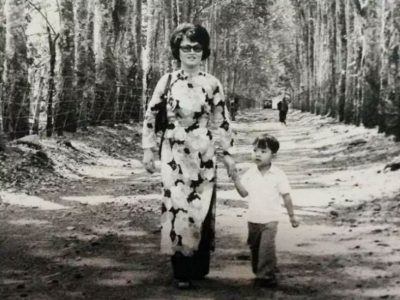
Viet Thanh Nguyen with his mother in the Vietnamese Highlands
The Hollywood Propaganda Machine
The novel is also a furious attack on Hollywood’s treatment of the Vietnam War. Nguyen is an academic who teaches as an associate professor of English and American studies and ethnicity at the University of South California. The novel was written during a pause in the creation of his non-fiction treatise, Nothing Ever Dies: Vietnam and the Memory of War which argues that “wars are fought twice; the first time on the battlefield, the second time in memory.” He is clearly furious at the way movies such as Apocalypse Now have depicted the conflict and keen to discuss this in front of the large audience the novel form can provide. To mask what is basically a soap-box lecture, he uses dark comedy to devastating effect.
The Captain is invited for an audience with an auteur director, (and yes, he is referred to as The Auteur) a barely concealed pastiche of Francis Ford Coppola. The director wants The Captain’s feedback on the script of his latest project. He expects a praising rubberstamp but gets quite the opposite:
“You didn’t even get the screams right, I said… basically in all the places in the script where one of my people has a speaking part, he or she screams. No words, just screams. So you should at least get the screams right. You have my people scream the following way: AIIEEEE!! But having heard many of my countrymen scream in pain, I can assure you this is not how they scream.”
Indeed, the novel feels like an effort to address an imbalance of memory. The vast majority of English-language literature of the conflict that we in the West call the Vietnam War but in Vietnam is known as the American War focusses of the experiences of Americans, with the Vietnamese themselves reduced to minor roles in their own conflagration.
The Auteur is angered by The Captain’s criticism but, apparently respecting his backbone, invites him as an advisor to the film shoot in the Philippines where all The Captain’s advice is ignored. The Vietnamese roles go to Filipinos and a heroic white man saves the good yellow people and kills the bad ones and the self-satisfied director announces: “Long after this war is forgotten, when its existence is a paragraph in a schoolbook students won’t even bother to read… these work of art will still shine so brightly it will not just be about the war but it will be the war.”
The Invisible Man
The Hollywood interlude, though bitingly funny, is a self-contained episode that feels a bit glued-on and somewhat disrupts the flow of the main story which is about confused identities, confused politics and loyal friendship.
The narrator, an obvious foreigner in America, has always been mocked at home in Vietnam as a “bastard”. His mother was Vietnamese and his father was a white French priest who refused to recognise him.
So The Captain is doubly conflicted. His life has been ripped apart by his entangled identity just as his country has been torn in two by the global battle of Left vs Right. Everyone seems to know in which camp they belong, but the Captain is adrift.
Bereft of a meaningful family, he has found an ersatz sense of belonging through a blood pact with two school friends; an intellectual called Man, who becomes his secret communist agent controller, and Bon, a passionate, earthy anti-communist. It is their friendship he values, not any ideology and his impossible mission to be faithful to both friends drives this compelling tale.
I loved this book. In its cynical moments it made me laugh, and in its melancholy moments even reduced me to tears, but also made me think of the distorting power of popular culture and the east-west divide. The German translation, by Wolfgang Müller, was published this month by Blessing and captures perfectly the tone of disillusioned self-recognition of a man sent to hell and back by the capricious twists of 20th century history.
“Außer einem Mann ohne Gesicht verstand nur ein Mann mit zwei Geschichten den Witz, dass nach einer Revolution, die für Abhängigkeit und Freiheit gekämpft hat, genau diese Dinge weniger als nichts wert sind. Ich war dieser Mann mit den zwei Geschichten, ich und ich.”
The Circles of History
This is a multifaceted historical novel that feels oppressively contemporary; not least during a late but haunting scene featuring desperate refugees putting all their money and hopes in a berth on a cramped boat at the mercy of tides and waves.
The plight of two million Vietnamese boat people is a reminder that the challenges of 2017 are by no means unprecedented and, as we look back in horror at the humanitarian failings of the late 1970s, that History will judge us on the way we treat those unfortunates chewed up and spat out by political developments they cannot control.
